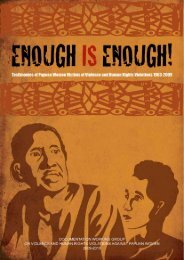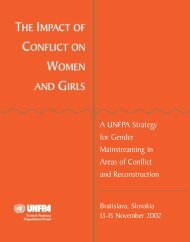War on Women: Time for Action to End Sexual Violence in Conflict
War on Women: Time for Action to End Sexual Violence in Conflict
War on Women: Time for Action to End Sexual Violence in Conflict
Create successful ePaper yourself
Turn your PDF publications into a flip-book with our unique Google optimized e-Paper software.
<str<strong>on</strong>g>War</str<strong>on</strong>g> <strong>on</strong> <strong>Women</strong>: <strong>Time</strong> <strong>for</strong> Acti<strong>on</strong> <strong>to</strong> <strong>End</strong> <strong>Sexual</strong> <strong>Violence</strong> <strong>in</strong> C<strong>on</strong>flict<br />
MIDDLE EAST<br />
“Children <strong>to</strong>ld us they have witnessed horrendous scenes. Some said they saw their fathers<br />
murdered and mothers raped. They described th<strong>in</strong>gs happen<strong>in</strong>g <strong>to</strong> other children,<br />
but they may have actually happened <strong>to</strong> them and they were just <strong>to</strong>o upset <strong>to</strong> talk about it –<br />
it’s a typical cop<strong>in</strong>g mechanism used by children who have suffered abuse.” 26<br />
Countries where sexual violence <strong>in</strong> c<strong>on</strong>flict has occurred <strong>in</strong>clude Iraq, Israel/Palest<strong>in</strong>e, Kuwait, Leban<strong>on</strong>,<br />
Yemen, Egypt, and Libya.<br />
Overall, there is little documentati<strong>on</strong> available <strong>on</strong> the prevalence of sexual violence <strong>in</strong> c<strong>on</strong>flict throughout<br />
the Middle East. <strong>Sexual</strong> violence has been used <strong>in</strong> attempts <strong>to</strong> silence political oppositi<strong>on</strong> and human<br />
rights defenders. Dur<strong>in</strong>g detenti<strong>on</strong>, it is used as a <strong>for</strong>m of <strong>to</strong>rture aga<strong>in</strong>st women and men, as reported<br />
<strong>in</strong> Iraq, Israel and the Palest<strong>in</strong>ian terri<strong>to</strong>ries. In Iraq, government-affiliated militias are us<strong>in</strong>g <strong>to</strong>rture and<br />
rape as comm<strong>on</strong> <strong>in</strong>vestigati<strong>on</strong> methods <strong>in</strong> police stati<strong>on</strong>s. Forms of sexual violence and humiliati<strong>on</strong><br />
<strong>in</strong>clude rape, gang rape, videotap<strong>in</strong>g and pho<strong>to</strong>graph<strong>in</strong>g of naked male and female deta<strong>in</strong>ees, <strong>for</strong>cibly<br />
plac<strong>in</strong>g deta<strong>in</strong>ees <strong>in</strong> various sexual positi<strong>on</strong>s, or <strong>for</strong>c<strong>in</strong>g groups of male deta<strong>in</strong>ees <strong>to</strong> masturbate <strong>on</strong> film.<br />
As <strong>in</strong> many parts of the world, survivors of sexual violence <strong>in</strong> the Middle East face extreme stigma. A<br />
woman or girl who has been raped is deemed <strong>to</strong> have brought shame up<strong>on</strong> her family. Many survivors<br />
do not report such crimes <strong>for</strong> fear of sexual exclusi<strong>on</strong>, re-victimizati<strong>on</strong>, or fall<strong>in</strong>g victim <strong>to</strong> “h<strong>on</strong>or kill<strong>in</strong>gs.”<br />
<strong>Sexual</strong> violence has been reported <strong>in</strong> the recent revoluti<strong>on</strong>s and political upris<strong>in</strong>gs sweep<strong>in</strong>g the Middle<br />
East as a retalia<strong>to</strong>ry <strong>to</strong>ol aga<strong>in</strong>st political opp<strong>on</strong>ents. For example, some female protes<strong>to</strong>rs <strong>in</strong> Egypt were<br />
arrested, <strong>to</strong>rtured and subjected <strong>to</strong> virg<strong>in</strong>ity tests. Further, the case of Iman al-Obeidi – who was allegedly<br />
raped by 15 pro-Gadhafi paramilitary troops <strong>in</strong> March 2011 – was widely reported <strong>in</strong> the <strong>in</strong>ternati<strong>on</strong>al<br />
media, and reports from doc<strong>to</strong>rs, surge<strong>on</strong>s and <strong>in</strong>ternati<strong>on</strong>al journalists <strong>in</strong> Libya c<strong>on</strong>firm the use of<br />
sexual violence <strong>to</strong> punish regime opp<strong>on</strong>ents.<br />
PALESTINE<br />
Accord<strong>in</strong>g <strong>to</strong> a survey of 4,212 households c<strong>on</strong>ducted by the Palest<strong>in</strong>ian Central Bureau of Statistics<br />
between December 2005 and January 2006, 23.3 per cent of married women <strong>in</strong> the West Bank and<br />
22.6 per cent <strong>in</strong> Gaza reported be<strong>in</strong>g victims of physical violence dur<strong>in</strong>g the year 2005. The same survey<br />
<strong>in</strong>dicated that 11.5 per cent of women <strong>in</strong> the West Bank and 9.7 per cent <strong>in</strong> Gaza reported hav<strong>in</strong>g<br />
experienced sexual violence at the hands of their husbands, and that <strong>on</strong>ly 1.2 per cent of the victims<br />
had filed a <strong>for</strong>mal compla<strong>in</strong>t. 27<br />
26. David Batty, “Libyan children suffer<strong>in</strong>g rape, aid agency reports,” The Guardian, April 23, 2011.<br />
27. Bastick et. al., 2007, p. 133.<br />
– 11 –





![IANSA [PDF, 2MB] - PeaceWomen](https://img.yumpu.com/25206379/1/190x123/iansa-pdf-2mb-peacewomen.jpg?quality=85)
![Commitments Sample [PDF, 93KB] - PeaceWomen](https://img.yumpu.com/25206331/1/190x245/commitments-sample-pdf-93kb-peacewomen.jpg?quality=85)










![A Toolkit for Advocacy and Action [PDF, 260KB] - Peace Women](https://img.yumpu.com/25205989/1/190x245/a-toolkit-for-advocacy-and-action-pdf-260kb-peace-women.jpg?quality=85)